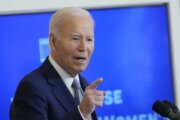DES MOINES, Iowa (AP) — Joe Wiederien was an unlikely candidate to challenge a Republican congressman in one of the nation’s most competitive House districts.
A fervent supporter of former President Donald Trump, Wiederien was registered as a Republican until months earlier. A debilitating stroke had left him unable to drive. He had never run for office. For a time, he couldn’t vote because of a felony conviction.
But he arrived last month at the Iowa Capitol with well over the 1,726 petition signatures needed to qualify for the ballot as a conservative alternative to first-term Republican Rep. Zach Nunn. After filing the paperwork, he flashed a thumbs up across the room at an operative he knew only as “Johnny.”
Several other unorthodox candidates have emerged across the country — all backed by the same shadowy group, the Patriots Run Project.
For the past year, the group has recruited Trump supporters to run as independent candidates in key swing districts where they could siphon votes from Republicans in races that will help determine which party controls the House next year, an Associated Press review has found. In addition to two races in Iowa, the group recruited candidates in Nebraska, Montana, Virginia and Minnesota. All six recruits described themselves as retired, disabled — or both.
The group’s operation provides few clues about its management, financing or motivation. But interviews, text messages, emails, business filings and other documents reviewed by the AP show that a significant sum has been spent — and some of it traces back to Democratic consulting firms.
While dirty tricks are as old as American elections, the efforts this year could have profound consequences in the fight to control Congress, which is expected to be decided by a handful of races. It’s also not an isolated example: allies of Trump have been working across the U.S. to get liberal academic Cornel West on the ballot in hopes he could play spoiler in the presidential election.
“At that time I was thinking, well, it would be nice to be in Congress and get to work with President Trump,” Wiederien, 54, reflected in an interview outside the Veterans Affairs hospital in Des Moines, where he was seeking treatment for a leaking incision on his head from previous brain surgery. “It looks like it’s a dirty trick now.”
Wiederien withdrew his candidacy last month after he says it became clear he’d been manipulated into running against Nunn. Now he wants an investigation to uncover the motives of those who made his candidacy possible.
Nunn on Monday called the effort a plot “to steal this election.”
“I am outraged to see anyone prey on hardworking Iowans or deceive voters,” he said.
A deceptive recruitment drive on Facebook
As with other recruits, Wiederien’s story begins with Facebook, where the Patriots Run Project operated a series of pro-Trump pages and ran ads that used apocalyptic rhetoric to attack establishment politicians in both parties while urging conservatives to run in November.
“We need American Patriots like YOU to stand for freedom with President Trump and take back control from the globalist elites by running for office,” one such ad states.
Some candidates say they were contacted because of their political posts on Facebook. Two others said the group reached out after they completed an online survey.
Once recruited, they communicated with a handful of operatives through text messages, emails and phone calls. In-person contact was limited. Patriots Run Project advised them about what forms to fill out and how to file required paperwork.
In at least three races, petition signatures to qualify for the ballot were circulated by a Nevada company that works closely with the Democratic consulting firm Sole Strategies, according to documents, including text messages and a draft contract, as well as the firm’s co-founder. In Iowa, a different Democratic firm conducted a poll testing attacks on Nunn, while presenting Wiederien as the true conservative.
Despite the ties to Democratic firms, there is a scant paper trail to determine who is overseeing the effort.
Patriots Run Project is not a registered business in the United States and it is not listed as a nonprofit with the IRS. It has not filed paperwork to form a political committee with the Federal Election Commission. The only concrete identifying detail listed on the group’s website is a P.O. Box inside a UPS store in Washington, D.C.
Messages left at email addresses and phone numbers for the group’s operatives went unanswered.
A spokesperson for the Democratic Congressional Campaign Committee, House Democrats’ campaign arm, said the organization had no knowledge of or involvement in the effort. House Majority PAC, the Democrats’ big spending congressional super PAC, was also not involved, a spokesman said.
Jason Torchinsky, a prominent Republican election lawyer and former Justice Department official, said investigators should take interest. “Given what is described, there could be a wide variety of federal and state criminal violations,” he said.
Rick Hasen, a law professor at the University of California, Los Angeles, said the effort “looks shady and unethical,” but added “it is hard to say whether any laws have been broken, which would depend not only on the facts, but also the statutes and precedents under state law.”
In Iowa, it is a crime to deprive or defraud voters of “a fair and impartially conducted election process,” while in Virginia ”conspiracy against rights of citizens” is a felony.
It’s not the first time Patriots Run Project has drawn attention.
In June, the Center for Strategic Dialogue, a London-based watchdog, issued a report that found the network of Patriots Run Project pages on Facebook were likely controlled by a small number of people, deceiving users and violating Facebook’s policies on “coordinated inauthentic behavior.” The ads also violated the site’s standards because they did not include disclaimers showing who was responsible.
Facebook took down the pages. But by then, the mystery operatives running the group were already working to get recruits on ballots.
Meta, Facebook’s parent company, didn’t respond to a request for comment. The company reported receiving $48,000 for the group’s ads.
‘They got me on the ballot’
Unlike Wiederien, other candidates said they believed the group had done nothing wrong.
Thomas Bowman, 71 and disabled after a kidney transplant, said he believes he likely was recruited to run against Democratic Rep. Angie Craig of Minnesota to split the conservative vote and help Craig win reelection in the suburban Minneapolis district. But the self-described constitutional conservative expressed gratitude for free help getting signatures.
“They got me on the ballot,” Bowman said. “If I had to do that all by myself, I couldn’t do it.”
In Montana, Dennis Hayes was recruited to run as a Libertarian against GOP Rep. Ryan Zinke. The group found a donor to give him $1,740 to cover his candidate filing fee, Hayes recalled. The donor, whom Hayes would not identify, went to Hayes’ bank with him to deposit the check, which Politico previously reported.
“I told them I didn’t have the money to run or I would. They got me a donor so I could run for Congress,” said Hayes, 70.
Robert Reid, a widowed retiree running against Republican Rep. Jen Kiggans in southeastern Virginia, said he was contacted by Patriots Run Project after posting his views to Facebook. His sole in-person contact was when a man drove to his home in a Mercedes SUV to drop off his completed petition signature paperwork.
“They seem to be nice people,” said Reid, a Trump supporter who will appear on November’s ballot for the swing district seat. The thought, however, did cross his mind that “these guys want me to run to draw votes away from” Kiggans.
In Nebraska, Army veteran and Trump supporter Gary Bera said he was asked to run as an independent against Rep. Don Bacon, a Republican who is facing a challenge. The district, which includes Omaha, is the state’s most competitive.
Bera was a truck driver and engineering draftsman before disability forced him from work. After he was recruited through an online survey, Bera said the group instructed him to open a business checking account, a requirement for declaring a federal candidacy. Because his car wouldn’t run, an operative agreed to pick him up to file paperwork with the state.
But plans changed abruptly last month when he was informed that the group had not collected enough signatures for him to qualify. “Now I’m putzing around,” Bera said.
In Iowa, the group recruited longtime GOP activist Stephanie Jones to run as an independent against Republican Rep. Mariannette Miller-Meeks, even though Jones does not live in that eastern Iowa district. Jones said the group paid to gather signatures for her but fell short.
Jones, a Trump supporter who is on disability due to post-traumatic stress disorder, then unsuccessfully sought the Libertarian Party nomination with an operative’s encouragement. She said she believes those behind the effort are genuine but desire anonymity because “they don’t want to be targets of the deep state.”
Operatives target a key race in Iowa
Wiederien, however, thinks the group had ulterior motives. The Iowa district he was recruited to run in has been fiercely contested in recent years. Nunn won by roughly 2,000 votes in 2022, while the Democrat who held the seat, Cindy Axne, eked out victories in two prior races that drew third-party candidates.
The Patriots Run Project identified Wiederien through Facebook last fall, and an operative calling himself “Knox” urged him to run: “God bless you. You’re a true patriot. We are gonna save our country!”
Wiederien, who has a collection of Trump merchandise and attended several Trump rallies, had text and phone conversations over the ensuing months with operatives who identified themselves as “Will Haywood” and “Johnny Shearer.”
The AP was unable to confirm whether Haywood and Shearer were real identities. A John Shearer who Wiederien said was involved said he would not confirm or deny any participation. “If I were in this covert political organization I wouldn’t really admit to it, would I?” he said.
The operatives convinced Wiederien to change his party affiliation from Republican to unaffiliated so he could qualify. They assured him his 2013 felony conviction for his third operating while intoxicated offense, which cost him his right to vote and run for office until 2016, wasn’t disqualifying.
They urged him to list his affiliation on the ballot as “America First.” They arranged for a firm to gather signatures across the district, which includes Des Moines, its suburbs and rural southern Iowa.
Those signatures were gathered by Common Sense America, a Nevada limited liability company created in February. A company disclosure filing in Colorado, which requires signature gatherers to register, lists a phone number for a co-founder of the Democratic consulting firm, Sole Strategies.
“We work very closely with Common Sense America,” Zee Cohen-Sanchez, the co-founder, said when contacted. Lisa Cohen, the registered agent for Common Sense America who appears to be Cohen-Sanchez’s mother, didn’t return messages.
Sole Strategies has earned nearly $1.8 million over the past four years working for Democratic candidates and causes, including numerous Democratic House members and candidates, records show. Jones said Common Sense America gathered signatures for her campaign.
A draft contract shows the firm was set to receive $3,300 for collecting signatures for Bera in Nebraska. A philanthropist listed on the document as the proposed buyer of those services is Carolyn Cohen of Nyack, New York, a registered Democrat who has a history of supporting liberal causes. “She doesn’t comment on her political donations,” her partner, Larry Miller, said.
Last month, a poll attacked Nunn as soft in his opposition to abortion, terrorists and Democrats — calling him “an errand boy for the uniparty elite”— while painting Wiederien as the pro-Trump conservative in the race.
A spokeswoman for the firm that operated the poll, Dynata, said that its client was Patinkin Research, which says it “has worked to elect dozens of Democratic candidates.” The spokeswoman later said she identified Patinkin in error and urged AP not to publish its identity. Patinkin’s founder didn’t return messages.
When it was time to submit his petitions, Wiederien said “Johnny” agreed to drive him the 75 miles to Des Moines and arrived in an electric car. The car needed to be charged before they could make the trek, so Wiederien said he entertained the operative with video clips of Trump while they waited.
Later, he said they met a man wearing a suit in an office near the Iowa Capitol who gave them paperwork and a binder full of his signatures. All Wiederien had to do was sign a form.
Wiederien’s statement of candidacy was notarized by a Des Moines paralegal whose firm has done some campaign-related work for Democrats. Firm representatives didn’t return messages.
Wiederien said he found it suspicious “Johnny” appeared to avoid a Capitol surveillance camera and declined to have his picture taken with him. Afterward, the group paid for an Uber to drive Wiederien home.
Soon, he heard from Republicans who convinced him he’d been tricked into thinking the Patriots Run Project had Trump’s support and withdrew his name from the ballot.
___
Slodysko reported from Washington.
Copyright © 2024 The Associated Press. All rights reserved. This material may not be published, broadcast, written or redistributed.







